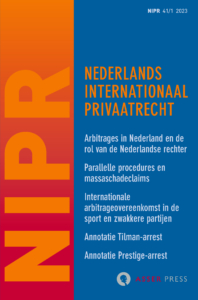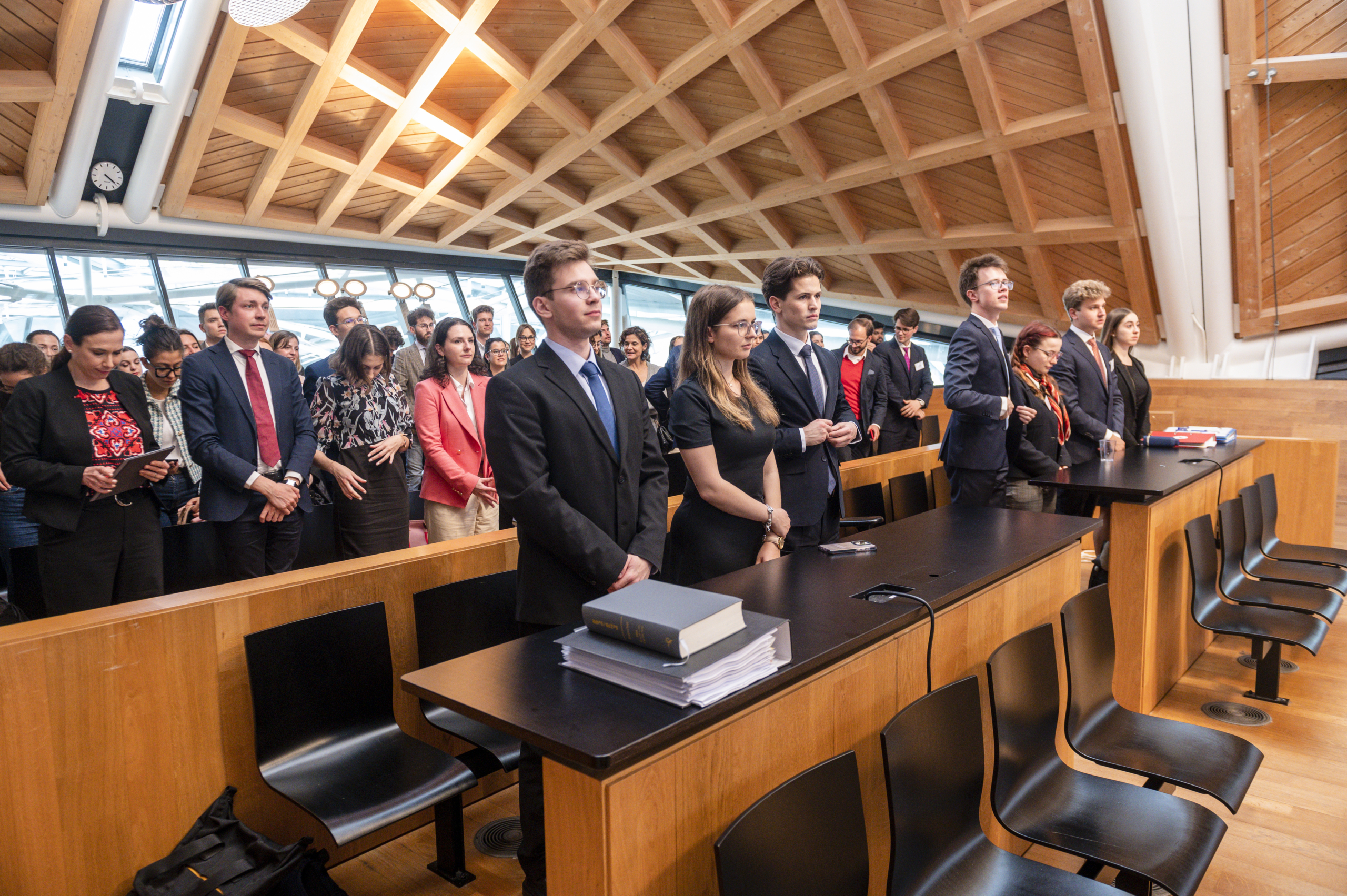The latest issue of the Dutch Journal on Private International Law (NIPR) has been published.

NIPR 2023 issue 1
Editorial
M.H. ten Wolde / p. 1-2
A.V.M. Struycken, Arbitrages in Nederland waarop de Nederlandse rechter geen toezicht kan houden / p. 3-8
Abstract
The Code of Civil Procedure contains a chapter on arbitration. Procedures and awards rendered in the Netherlands are subject to a certain degree of scrutiny by the civil courts. This authority, however, does not extend to arbitration on litigation between private enterprises and a foreign State.
This exception applies to such awards rendered at the Peace Palace under the flag of the Permanent Court of Arbitration. This also applies to awards, if rendered in the Netherlands, based on investment treaties like the Washington Convention of 18 March 1965 which created the International Center for the Settlement of Investment Disputes (ICSID). It was correctly recognized by the Act of 1 November 1980 providing for a special rule.
A 1983 proposal to declare that awards rendered by the Iran-US Tribunal situated in The Hague are Dutch awards was not successful. The proposal was only retracted in 2000.
The Comprehensive Economic and Trade Agreement (CETA) 2016, between the EU and its Member States, on the one side, and Canada, on the other, which was approved for ratification by the Netherlands in July 2022, provides for arbitration in its Articles 27 and 28, within the framework of its investment court system. The recognition and execution of its awards in the Netherlands must still be implemented.
In arbitration based on investment treaties an issue of public international law is involved. This is ignored in Dutch caselaw, however.
N. Touw & I. Tzankova, Parallel actions in cross-border mass claims in the EU: a (comparative) lawyer’s paradise? / p. 9-30
Abstract
In the context of cross-border mass harms, collective redress mechanisms aim to offer (better) access to justice for affected parties and to facilitate procedural economy. Even when national collective redress mechanisms seek to group cases together, it is likely that cross-border parallel actions will still be filed. Parallel actions risk producing irreconcilable judgments with conflicting or inconsistent outcomes and the rules of European private international law aim to reduce this risk. This contribution argues that the rules on parallel actions currently run the risk of not achieving their objective in the context of mass claims and collective redress. Given their lack of harmonization, when collective redress mechanisms with different levels of representation are used, the application of the rules on parallel actions can cause procedural chaos. In addition, judges have a great deal of discretion in applying the rules on parallel actions, whilst there is a lack of guidance on how they should use this discretion and what criteria to apply. They may be unaware of the effects on the access to justice of their decisions to stay or proceed with a parallel collective action. This contribution argues that there should be more awareness about the interaction (and sometimes perhaps even a clash) between the goals of private international law and of collective redress and of how access to justice can come under pressure in the cross-border context when the traditional rules on parallel actions are applied. A stronger focus on the training and education of judges and lawyers in comparative collective redress could be a way forward.
N. Mouttotos, Consent in dispute resolution agreements: The Pechstein case law and the effort to protect weaker parties / p. 31-50
Abstract
The unending Pechstein saga involving the German speed skater and Olympic champion Claudia Pechstein and the International Skating Union has acquired a new interesting turn with the decision of the German Federal Constitutional Court. Among the various interesting questions raised, the issue of party autonomy, especially in instances of inequality in bargaining power, and the resulting compelled consent in dispute resolution agreements is of great relevance for private international law purposes. This article deals with the part of the judgment that focuses on the consensual foundation that underpins arbitration in the sporting context, providing a systematic examination with other areas of the law where other forms of regulation have emerged to remedy the potential lack of consent. This is particularly the case when it involves parties who are regarded as having weaker bargaining power compared to their counterparty. In such cases, procedural requirements have been incorporated in order to ensure the protection of weaker parties. The legal analysis focuses on European private international law, also merging the discussion with substantive contract law and efforts to protect weaker parties by way of providing information. This last aspect is discussed as a remedy to the non-consensual foundation of arbitration in the sporting context.
CASE NOTES
A. Attaibi & M.A.G. Bosman, Forumkeuzebeding in algemene voorwaarden: de ‘hyperlink-jurisdictieclausule’ nader bezien. HvJ EU 24 november 2022, ECLI:EU:C:2022:923, NIPR 2022-549 (Tilman/Unilever) / p. 51-58
Abstract
Tilman v. Unilever concerns the validity of a jurisdiction clause included in the general terms and conditions contained on a website, in case the general terms and conditions are referenced via a hyperlink in a written B2B contract. The CJEU held that such a jurisdiction clause is valid, provided that the formal requirements of Article 23 Lugano Convention 2007, that ensure the counterparty’s consent to the clause, are met. In this annotation the authors discuss and comment on the CJEU judgment, also in the broader context of earlier CJEU judgments on jurisdiction clauses contained in general terms and conditions.
K.J. Saarloos, Arbitrage en de effectiviteit van de EEX-Verordening naar aanleiding van de schipbreuk van de Prestige in 2002. Hof van Justitie EU 20 juni 2022, zaak C-700/20, ECLI:EU:C:2022:488, NIPR 2022-544 (London Steam-Ship Owners’ Mutual Insurance Association Ltd/Spanje) / p. 59-74
Abstract
The CJEU’s ruling in the Prestige case confirms the rule from the J/H Limited case (2022) that a judgment by a court of a Member State is a judgment within the meaning of Article 2 of the EEX Regulation if the judgment is or could have been the result of adversarial proceedings. The content of the judgment is not relevant for the definition. Judgments recognising judgments by arbitrators or the courts of third countries are therefore judgments within the meaning of the EEX Regulation. The question of the definition of the term judgment must be distinguished from the material scope of the EEX Regulation. A judgment recognising an arbitral award is not covered by the EEX Regulation’s rules on recognition and enforcement; however, such a judgment may be relevant for the application of the rule that the recognition of the judgment of a court of a Member State may be refused if the judgment is irreconcilable with a judgment given in the Member State addressed.
The ruling in the Prestige case also makes it clear that a judgment by a Member State court on arbitration cannot impair the effectiveness of the EEX Regulation. If it does, that judgment cannot be opposed to the recognition of an incompatible judgment from the other Member State. The CJEU thus formulates an exception to the rule that a judgment from a Member State may not be recognised if the judgment is irreconcilable with a judgment in the Member State addressed: that ground for refusal is not applied if the irreconcilable judgment in the requested Member State violates certain rules in the EEX Regulation. The ruling raises questions both in terms of substantiation and implications for the future. It is not convincing to limit a statutory limitation on the effectiveness of the EEX Regulation by invoking the same effectiveness. Moreover, the ruling creates tension with the rule that the New York Convention takes precedence over the EEX Regulation.


